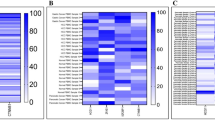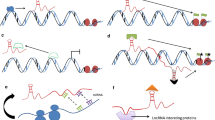Abstract
Pancreatic cancer (PC) is the fourth leading cause of cancer-related mortalities in the USA and the sixth leading cause of mortality in China. Recent studies have shown that lncRNAs play important roles in carcinogenesis. The aim of this study was to explore the role of lncRNA HULC in PC. Quantitative real-time PCR was performed to investigate the expression of HULC in tumor tissues and corresponding normal tissues from 304 patients with PC. The higher expression of HULC was significantly correlated with large tumor size, advanced lymph node metastasis and vascular invasion. Multivariate analyses revealed that HULC expression served as an independent predictor for overall survival (P = 0.032). Further experiments revealed that HULC knockdown significantly repressed cell proliferation of PC in vitro. In conclusion, our results suggest that HULC may serve as a candidate prognostic biomarker through growth regulation in human PC.




Similar content being viewed by others
References
Wolfgang CL, Herman JM, Laheru DA, Klein AP, Erdek MA, Fishman EK, et al. Recent progress in pancreatic cancer. CA Cancer J Clin. 2013;63(5):318–48. doi:10.3322/caac.21190.
Ryan DP, Hong TS, Bardeesy N. Pancreatic adenocarcinoma. N Engl J Med. 2014;371(11):1039–49. doi:10.1056/NEJMra1404198.
Crawford SM. The importance of primary care for cancer diagnoses. Lancet Oncol. 2014;15(2):136–7. doi:10.1016/S1470-2045(14)70013-0.
Mattick JS, Makunin IV. Non-coding RNA. Human molecular genetics. 2006;15 Spec No 1:R17-29. doi:10.1093/hmg/ddl046.
Mercer TR, Dinger ME, Mattick JS. Long non-coding RNAs: insights into functions. Nat Rev Genet. 2009;10(3):155–9. doi:10.1038/nrg2521.
Taft RJ, Pang KC, Mercer TR, Dinger M, Mattick JS. Non-coding RNAs: regulators of disease. J Pathol. 2010;220(2):126–39. doi:10.1002/path.2638.
Gibb EA, Brown CJ, Lam WL. The functional role of long non-coding RNA in human carcinomas. Mol Cancer. 2011;10. doi:10.1186/1476-4598-10-38.
Yang Z, Zhou L, Wu LM, Lai MC, Xie HY, Zhang F, et al. Overexpression of long non-coding RNA HOTAIR predicts tumor recurrence in hepatocellular carcinoma patients following liver transplantation. Ann Surg Oncol. 2011;18(5):1243–50. doi:10.1245/s10434-011-1581-y.
Kim K, Jutooru I, Chadalapaka G, Johnson G, Frank J, Burghardt R, et al. HOTAIR is a negative prognostic factor and exhibits pro-oncogenic activity in pancreatic cancer. Oncogene. 2013;32(13):1616–25. doi:10.1038/onc.2012.193.
Nie Y, Liu X, Qu SH, Song EW, Zou H, Gong C. Long non-coding RNA HOTAIR is an independent prognostic marker for nasopharyngeal carcinoma progression and survival. Cancer Sci. 2013;104(4):458–64. doi:10.1111/cas.12092.
Lai MC, Yang Z, Zhou L, Zhu QQ, Xie HY, Zhang F, et al. Long non-coding RNA MALAT-1 overexpression predicts tumor recurrence of hepatocellular carcinoma after liver transplantation. Med Oncol. 2012;29(3):1810–6. doi:10.1007/s12032-011-0004-z.
Han YH, Liu YC, Zhang H, Wang TT, Diao RY, Jiang ZM, et al. Hsa-miR-125b suppresses bladder cancer development by down-regulating oncogene SIRT7 and oncogenic long non-coding RNA MALAT1. FEBS Lett. 2013;587(23):3875–82. doi:10.1016/j.febslet.2013.10.023.
Ji Q, Zhang L, Liu X, Zhou L, Wang W, Han Z, et al. Long non-coding RNA MALAT1 promotes tumour growth and metastasis in colorectal cancer through binding to SFPQ and releasing oncogene PTBP2 from SFPQ/PTBP2 complex. Br J Cancer. 2014;111(4):736–48. doi:10.1038/bjc.2014.383.
Jiang Y, Li YH, Fang SJ, Jiang BY, Qin CF, Xie PL, et al. The role of MALAT1 correlates with HPV in cervical cancer. Oncol Lett. 2014;7(6):2135–41. doi:10.3892/ol.2014.1996.
Ren SC, Liu YW, Xu WD, Sun Y, Lu J, Wang FB, et al. Long noncoding RNA MALAT-1 is a new potential therapeutic target for castration resistant prostate cancer. J Urol. 2013;190(6):2278–87. doi:10.1016/j.juro.2013.07.001.
Wang JQ, Su LP, Chen XH, Li P, Cai Q, Yu BQ, et al. MALAT1 promotes cell proliferation in gastric cancer by recruiting SF2/ASF. Biomed Pharmacother. 2014;68(5):557–64. doi:10.1016/j.biopha.2014.04.007.
Wu XS, Wang XA, Wu WG, Hu YP, Li ML, Ding Q, et al. MALAT1 promotes the proliferation and metastasis of gallbladder cancer cells by activating the ERK/MAPK pathway. Cancer Biol Ther. 2014;15(6):806–14. doi:10.4161/cbt.28584.
Kam Y, Rubinstein A, Naik S, Djavsarov I, Halle D, Ariel I, et al. Detection of a long non-coding RNA (CCAT1) in living cells and human adenocarcinoma of colon tissues using FIT-PNA molecular beacons. Cancer Lett. 2014;352(1):90–6. doi:10.1016/j.canlet.2013.02.014.
Crea F, Watahiki A, Quagliata L, Xue H, Pikor L, Parolia A, et al. Identification of a long non-coding RNA as a novel biomarker and potential therapeutic target for metastatic prostate cancer. Oncotarget. 2014;5(3):764–74.
Wang JY, Liu XF, Wu HC, Ni PH, Gu ZD, Qiao YX, et al. CREB up-regulates long non-coding RNA, HULC expression through interaction with microRNA-372 in liver cancer. Nucleic Acids Res. 2010;38(16):5366–83. doi:10.1093/nar/gkq285.
Zhao Y, Guo QH, Chen JJ, Hu J, Wang SW, Sun YM. Role of long non-coding RNA HULC in cell proliferation, apoptosis and tumor metastasis of gastric cancer: a clinical and in vitro investigation. Oncol Rep. 2014;31(1):358–64. doi:10.3892/or.2013.2850.
Liu Y, Pan SD, Liu L, Zhai XJ, Liu JB, Wen J et al. A genetic variant in long non-coding RNA HULC contributes to risk of HBV-related hepatocellular carcinoma in a Chinese population. Plos One. 2012;7(4). doi:10.1371/journal.pone.0035145.
Huang JL, Zheng L, Hu YW, Wang Q. Characteristics of long non-coding RNA and its relation to hepatocellular carcinoma. Carcinogenesis. 2014;35(3):507–14. doi:10.1093/carcin/bgt405.
Hidalgo M. Pancreatic cancer. N Engl J Med. 2010;362(17):1605–17. doi:10.1056/NEJMra0901557.
Acknowledgments
This work was supported by Grants from Research Office of Jiangsu Cancer Hospital (No. ZK201401).
Conflict of interest
None.
Author information
Authors and Affiliations
Corresponding author
Additional information
Wei Peng and Wei Gao have contributed equally to this work.
Rights and permissions
About this article
Cite this article
Peng, W., Gao, W. & Feng, J. Long noncoding RNA HULC is a novel biomarker of poor prognosis in patients with pancreatic cancer. Med Oncol 31, 346 (2014). https://doi.org/10.1007/s12032-014-0346-4
Received:
Accepted:
Published:
DOI: https://doi.org/10.1007/s12032-014-0346-4




